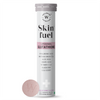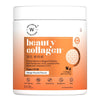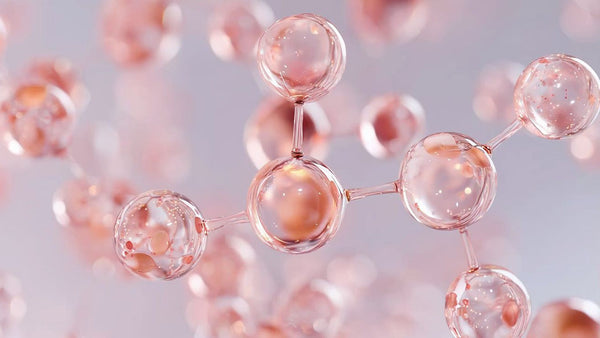First things first, hyaluronic acid is a naturally occurring compound in our body that is important for our overall health. However, as we age, production tends to decrease, which causes a range of issues like early signs of aging, joint pain, hair fall, etc. So what’s the remedy? Well, here’s where hyaluronic acid supplements come to the rescue. These days, you can mostly find it in skin care supplements and topicals, as it helps improve your skin's health in the most natural way possible. Having said that, what exactly is hyaluronic acid? Is hyaluronic acid good? If you’re looking for answers, you’ve come to the right place. In this article, we’ve listed all the benefits of hyaluronic acid and how their benefits go beyond skin health.
What is Hyaluronic Acid?
Also known as hyaluronan, hyaluronic acid (HA) is a kind of sugar that is gooey in texture and is found in the largest amounts in your skin, eyes, and connective tissues. It helps in the retention of water in your tissues to keep them well-lubricated, moist, and plump. It is used in serums, supplements, eye drops, and more.
5 Benefits of Hyaluronic Acid
Just like the production of collagen and elastin decreases in our body as we age, hyaluronic acid also decreases over time. This is why we need to supply HA to our bodies via supplements or serums.
Let’s discuss a few benefits of hyaluronic acid that make it worth the investment.
1. Makes Your Skin Supple
Hyaluronic acid forms a major portion of your skin and helps it bind to water and retain moisture. However, as we age and are exposed to UV rays, smoking, and pollution, our skin stops retaining HA as it used to. This is when the use of hyaluronic acid supplements, serums, or creams comes into play.
A placebo-controlled study was conducted over 12 weeks to study the effect of oral ingestion of HA. The results reveal that within 12 weeks, the skin condition had drastically improved in terms of the number of wrinkles, hydration of the skin, elasticity, and transepidermal water loss. In layman’s terms, taking hyaluronic acid orally can make your skin healthier and more youthful within 12 weeks.
2. Improves Wound Healing
Many people are unaware that hyaluronic acid can help with wound healing. Our body naturally increases the production of HA when there is a need to repair a wound. It helps regulate inflammation and builds more blood vessels where the injury is. This is the reason why HA is present in many anti-inflammatory creams and ointments, as they can be applied topically for faster wound healing and to decrease pain. With its antibacterial properties, HA also reduces the risk of infections.
How can you make HA better? By combining it with collagen! There are three stages to the healing process, and the final two strongly rely on collagen's impact on the injured area. After the age of 20, your body produces less collagen, which slows down the healing process. All you need for rapid healing is a supplement containing collagen peptides and HA.
3. Helps with Dry Eyes
With our lifestyle and habits, dry eyes are a very common phenomenon these days. Since HA helps retain moisture, it also plays a role in treating dry eyes. Most eye drops containing 0.2-0.4% HA have proven to be effective for dry eye symptoms. Having said that, eye drops are meant for temporary relief and not for long-term use. For long-term benefits, you can try ingesting HA via supplements to help keep your eyes hydrated.
4. Relieves Joint Pain
Hyaluronic acid is also found in joints, where it lubricates the area between your bones. The bones are less likely to grind against each other and create discomfort when the joints are lubricated. For more serious conditions, HA injections are given to the affected area when there is a lot of wear and tear in the joints for fast results. However, we can prevent complications like osteoarthritis when we start taking hyaluronic acid supplements earlier in life.
5. Improves Hair Quality
We've already spoken about how Hyaluronic acid keeps your skin hydrated. Of course, your scalp is a component of your skin as well. Hyaluronic acid functions as a humectant, allowing hair fibers to draw in and hold onto moisture. Due to its ability to hydrate and fill in the porous hair shaft, it is particularly beneficial for dry, damaged hair.
How to Use Hyaluronic Acid?
Hyaluronic acid is a popular skincare ingredient known for its hydrating and anti-aging properties. Hyaluronic acid uses can be in various forms, such as serums, creams, and sheet masks. But to fully reap the benefits of hyaluronic acid, it's also best to consume hyaluronic acid supplements. Here's a general guide on how to use hyaluronic acid:
Topical Uses of Hyaluronic Acid
1. Cleanse your face:
Start by washing your face with a gentle cleanser to remove any dirt, oil, and makeup. Pat it dry with a clean towel.
2. Tone (optional):
If you use a toner as part of your skincare routine, apply it after cleansing. This step helps balance the skin's pH levels and prepares it for better absorption of subsequent products.
3. Apply hyaluronic acid serum:
Take a few drops of hyaluronic acid serum onto your fingertips or the palm of your hand. Gently pat or massage it into your skin, focusing on areas that need hydration or have fine lines or wrinkles. Allow the serum to absorb fully before moving on to the next step.
4. Moisturize:
After the hyaluronic acid serum has been absorbed, apply your regular moisturizer to seal in the hydration. The moisturizer can be in the form of a cream, lotion, or gel. Choose one that suits your skin type and preferences.
5. Sun protection:
If you're applying hyaluronic acid in your morning routine, make sure to follow it up with a broad-spectrum sunscreen with at least SPF 30. Hyaluronic acid can help retain moisture, but sun protection is crucial to preventing sun damage and premature aging.
6. Adjust usage based on your skin's needs:
Depending on your skin's condition and the specific product you're using, you may apply hyaluronic acid once or twice daily.
Hyaluronic Acid Supplement Uses
You don't need a prescription to get hyaluronic acid supplements, which come in powder, liquid, tablet, capsules, and gummy forms. Many brands combine hyaluronic acid with other ingestible ingredients such as collagen and biotin to enhance the benefits.
Additional Tips for Hyaluronic Acid Uses:
- Before incorporating any new skincare product, do a patch test on a small area of your skin to check for any potential allergic reactions.
- Hyaluronic acid can be used alongside other skincare ingredients, such as vitamin C, retinol, and niacinamide. Just ensure you're using compatible products and follow any instructions regarding product layering and order of application.
- Hyaluronic acid can be used on all skin types, including oily, dry, and sensitive skin.
- Remember to stay consistent while consuming hyaluronic acid supplements for the skin to see long-term benefits.
- Please note that while hyaluronic acid is generally safe and well tolerated, individual experiences may vary. If you have any specific concerns or conditions, it's best to consult with a dermatologist or skincare professional for personalized advice.
Possible Safety & Side Effects of Hyaluronic Acid?
Hyaluronic acid is commonly found in skincare products like serums, creams, and lotions, as well as eye care items. It’s generally considered safe for most individuals. Oral supplements of hyaluronic acid are also deemed secure. However, like any ingredient, there are some potential safety concerns and side effects to be aware of.
Potential Safety Concerns:
- Allergic Reactions: In rare cases, some people might experience allergic reactions, such as itching, rash, or swelling.
- Skin Sensitivity: Certain individuals may experience mild irritation or redness, especially if their skin is more sensitive.
- Medication Interactions: While hyaluronic acid is typically safe, it’s recommended to consult with a healthcare provider if you're taking other medications or supplements.
- Digestive Discomfort: Oral forms of hyaluronic acid may cause occasional digestive issues, like bloating or nausea.
- Injection Risks: In injectable forms, hyaluronic acid can sometimes lead to risks such as infection, bruising, or swelling at the injection site.
Common Side Effects:
- Mild Redness: Some users might notice slight redness or irritation at the application site.
- Dryness: Overuse of topical hyaluronic acid can occasionally lead to skin dryness.
- Temporary Swelling: Injected hyaluronic acid may cause swelling or discomfort at the site of injection.
- Headaches: Oral supplements could cause mild headaches or dizziness in a few individuals.
Types of Hyaluronic Acid Supplements
Nowadays, hyaluronic acid supplements for skin and hyaluronic acid supplements for joints come in various forms, such as powders, liquids, capsules, fizzy tabs, and even gummies.
If you’re looking for hyaluronic acid skincare supplements or supplements to enhance your overall beauty needs, you can opt for capsules that use delayed-release technology and releases all the nutrients over a span of 8 hours to ensure better absorption.
If you have difficulties swallowing capsules, you can also opt for hyaluronic acid supplements that come in the form of powders or fizzy tabs. With powders, all you need to do is mix them into your favorite foods or drinks, and you’re good to go. Fizzy tabs are a much more travel-friendly alternative. All you need to do is drop the tab in a glass of water and enjoy.
Wrapping Up
The skin care industry is going gaga over hyaluronic acid as a potent ingredient to retain skin moisture. Besides the skin, HA is capable of improving your bone and joint health, hair quality, and eye health. We discussed the 5 greatest benefits of hyaluronic acid in this post; however, it is critical to inform your healthcare practitioner about all medications you are taking, including vitamins, ointments, etc. They can assist you in better understanding any potential issues.
FAQs
Can hyaluronic acid be used for all skin types?
Hyaluronic acid is a versatile skincare ingredient that can be beneficial for all skin types. Whether you have dry, oily, combination, or sensitive skin, hyaluronic acid can work wonders.
For dry skin, hyaluronic acid supplements are like a glass of water, providing deep hydration and helping to alleviate dryness and tightness. It attracts and retains moisture, leaving your skin plump and supple.
If you have oily skin, hyaluronic acid for skin helps hydrate the skin without clogging pores. It also balances moisture levels and supports a healthier complexion.
Combination skin can also benefit from hyaluronic acid's ability to provide hydration where it's needed most. It can help regulate moisture in different areas of the face, ensuring a harmonious balance.
Can hyaluronic acid help with acne-prone skin or oily skin?
Yes, hyaluronic acid benefits extend to oily skin types as well. This ingredient helps balance the skin’s moisture levels while reducing the production of excess oil.
Is hyaluronic acid safe to use during pregnancy or breastfeeding?
While there aren't any major hyaluronic acid side effects, before starting any new supplements, especially during pregnancy or while breastfeeding, it's always best to consult with your healthcare provider. They can provide personalized advice based on your specific circumstances and medical history.
- Hyaluronic Acid: Molecular Mechanisms and Therapeutic, Ramesh C. Gupta, Rajiv Lall, Ajay Srivastava, and Anita Sinha, Frontiers in Veterinary Science, 2019, doi: 10.3389/fvets.2019.00192, (https://www.ncbi.nlm.nih.gov/pmc/articles/PMC6603175/)
- Hyaluronic acid: A key molecule in skin aging, Eleni Papakonstantinou, Michael Roth, and George Karakiulakis , Dermato Endocrinology, 2012, doi: 10.4161/derm.21923, (https://www.ncbi.nlm.nih.gov/pmc/articles/PMC3583886/)
- Hyaluronic Acid in Inflammation and Tissue Regeneration, Malgorzata Litwiniuk, Alicja Krejner, Marcus S Speyrer, Anibal R Gauto, Tomasz Grzela, Wounds: A compendium of clinical research and practice, 2016, (https://pubmed.ncbi.nlm.nih.gov/26978861/)
- Hyaluronan in wound healing: rediscovering a major player, Kessiena L Aya, Robert Stern, Wound Repair and Regeneration, 2014, (https://pubmed.ncbi.nlm.nih.gov/25039417/)
- Hyaluronic Acid and Its Composites as a Local Antimicrobial/Antiadhesive Barrier, C.L. Romanò, E. De Vecchi, M. Bortolin, I. Morelli, and L. Drago, Journal of Bone and Joint Infection, 2017, doi: 10.7150/jbji.17705, (https://www.ncbi.nlm.nih.gov/pmc/articles/PMC5423572/)
- Efficacy and Safety of 0.2% Hyaluronic Acid in the Management of Dry Eye Disease, José Pinto-Fraga, Alberto López-de la Rosa, Francisco Blázquez Arauzo, Rubén Urbano Rodríguez, María J González-García, Clinical Trial, 2017, doi: 10.1097/ICL.0000000000000236, (https://pubmed.ncbi.nlm.nih.gov/26783978/)



























